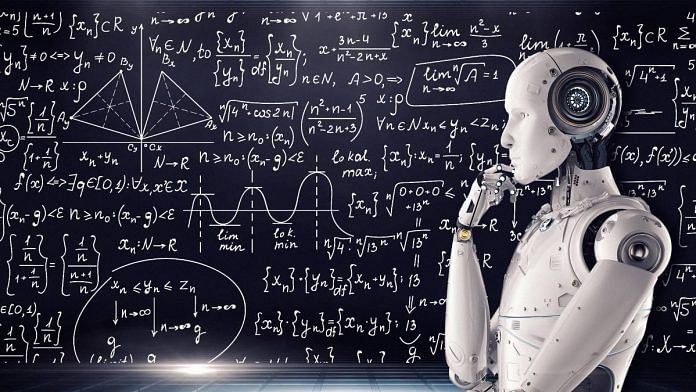Thank you dear subscribers, we are overwhelmed with your response.
Your Turn is a unique section from ThePrint featuring points of view from its subscribers. If you are a subscriber, have a point of view, please send it to us. If not, do subscribe here: https://theprint.in/
The last week witnessed more than usual attention from global leaders on the future development of Human-centric and safe AI. With astounding human-like cognitive abilities and astonishing computational prowess, AI is creating buzz and raising eyebrows. As AI assumes an increasingly prominent role in our lives, an unprecedented civilizational change is on the horizon.
There are several issues around AI, with privacy, bias, and ethical implications being the most salient ones. The potential impact of AI on human cognitive abilities is another issue of critical concern. As AI systems harbor into our lives, an inherent threat to human cognitive development lurks in the future. The danger is more potent for youngsters and older people.
Welcome to the world where humans coexist with AI. Now, if you have a puzzle, there is no need to heed anymore. AI MacGyvers a solution for practically every problem that would have otherwise required you to use your brain. “Don’t you worry about a thing: Ask Me Anything.”, says Bard, DALL-E, ChatGPT, or Sophia.
Isn’t that something to cheer about?
Perhaps not.
In the field of cognitive psychology, the theory of “use-it-or-lose-it” suggests that if one doesn’t utilize some function or ability within a specific timeframe, one loses those abilities. Elizabeth B. Fauth, a professor and director of Alzheimer’s Disease and Dementia Research Center at UtahState University, writes in her fact sheet titled “A Healthy Brain: Use It or Lose It!” that to build a high-capacity brain, you need to engage in more intellectual activities.
The human brain has a cognitive reserve with a pool of neurons and interconnections between them, forming a neural network. Cognitive development during early childhood and adolescence is characterized by building billions of new interconnections among our brain’s neurons. These new interconnections are built by gaining first-hand experiences and personal engagement in problem-solving and creative exercises. All the machine learning algorithms mimic this biological process of learning. Simply put, we need to ‘do it ourselves’ to learn. The more we engage, the more we learn.
Thus, by limiting personal effort, engagement, and missing experiences, we shall limit our brain from forming new interconnections amongst the neurons, which helps it function in new ways and make better decisions.
As AI does everything that was earlier possible through only human intellect, it not only takes away jobs but asserts that the human mind is redundant to artificial intelligence and is not needed, at least in the workplace. That certainly takes away the motivation to accumulate knowledge and develop intellectual abilities. Further, what would be the motivation to use individual intellectual abilities at places other than the workplace, like home and educational institutions? AI systems and tools shall push us into our comfort zone, motivating us to do all intellectual work through AI rather than put in personal effort. With bicycles and motor-driven vehicles becoming part of our lives, walking and running are merely reduced to sports or fun activities rather than a necessity. With a powerful AI system as an assistant ready to solve all sorts of simple or complex tasks, would anyone be motivated to use their own skills? Isn’t it indicative and suggestive of a future where human intelligence is mostly put to rest rather than tests?
If necessity is the mother of all inventions, then being unnecessary is the root cause of all extinctions. The unique cognitive abilities of humans, including their capacity for memorization, comprehension, analysis, decision-making, learning, and relearning, shouldn’t be rendered obsolete due to AI with similar capabilities. Over-reliance on AI may lower one’s motivation to think critically and design original solutions, which, in turn, will reduce one’s capacity to do so. Using AI systems should be regulated and allowed under supervision. It should only be preferred when someone suffers from a learning disability or solves highly complex problems beyond the boundary of the human brain. It should be very carefully used to augment and extend humans’ cognitive faculties and never as a replacement for it.
References:
- Fauth, Elizabeth B. and Norton, Maria C., “A Healthy Brain: Use It or Lose It!” (2017). All Current Publications. Paper 1781. Available at https://digitalcommons.usu.edu/extension_curall/1781
- Mike Brooks, “The Domino Effect: How AI Will Soon Outsmart Us All” (2023). Available at https://www.psychologytoday.com/intl/blog/tech-happy-life/202310/the-ai-domino-effect-how-ai-will-soon-outsmart-us-all
3. Gillian Carpenter, “AI and the Impact on Cognitive Development” (2023). Available at https://www.plc.nsw.edu.au/blogs/ai-and-the-impact-on-cognitive-development-/
A brief about the authors:
Ish Nath Jha, is an assistant professor of Computer Science and Engineering at Sikkim Manipal Institute of Technology, Sikkim. He has more than 15 years of experience of teaching Computer Science to the undergraduate and post graduate students of Engineering. Additionally he also contributes as associate NCC officer with 3 Sikkim Bn NCC and works with AIC-SMUTBI(Atal Incubation Center). He is the innovation ambassador for the MoE’s Innovation Cell. His interest area lies in Data Mining, Machine Learning, Artifical Intelligence and Public Policy. His research is published in Internation Journals.
Co-author, Dr. Krishna Vijay Kr. Singh is also an assistant professor of Computer Application at Sikkim Manipal Institute of Technology, Sikkim. He too has more than 15 years of experience of teaching and has research publication in International Journals.
These pieces are being published as they have been received – they have not been edited/fact-checked by ThePrint.

